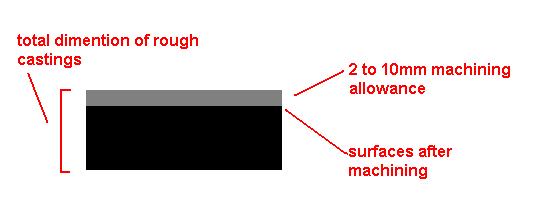| |
What is Machining Tolerances?
Machining tolerances
are meaning how many dimensional allowances the casting producers
need to leave for the machining works. Please see the following
diagram. On the surfaces after machining, the rough casting
producers need to leave 2 to 10 mm machining allowance for the
machining.

Why we need to
consider the machining allowances?
Some buyers may think the allowances should be considered by rough
casting producers, and it has no relations with buyers. This is not
total correct for the following some reasons.
1. If the casting producers just supply the rough castings, then
buyers have designated other
machining workshops to machine for them. Then, the buyers
or machining workshops have to tell the rough casting producers
about the machining allowances, in case of the insufficient
allowance for the machining.
2. Even the casting
foundry in charge of machining in-house. If the buyers could provide
more information about the machining allowances, then it will be
more helpful for casting foundries
to reduce the sampling time, and reduce more wastage. If the cast
foundries use metal
patterns, then the allowance should be considered carefully
since the modification to the metal patterns will be more difficult.
3. The metal
foundries consider their
rough casting costs based on the real rough weights of
castings, which means if the machining allowances are too large,
then their production costs will be increased, and so their prices
will be higher. If the buyers could give correct information to the
allowances, then it will be very helpful to reduce the
casting prices.
How to consider the machining allowances?
Most machining allowances should be considered by the experiences.
Normally, as for the automatic
molding line, molding machines and
shell molding processes,
then 2 to 3mm will be suitable. As for the
manual green sand and
resin sand casting process,
then 3mm to 5mm will be proper. However, as for the
large castings, or for
large surfaces, then the machining allowance should be 5mm to 10mm.
This is because large castings have larger dimensional tolerances,
and more surface casting
defects, so larger machining allowance will be necessary to
remove defects and avoid allowance insufficiency.
Of course, the metal foundries should have more experiences than
buyers, but at least, the buyers should understand why the suppliers
always care about the rough casting weights, and machined weights.
Home |
More Articles |
|
